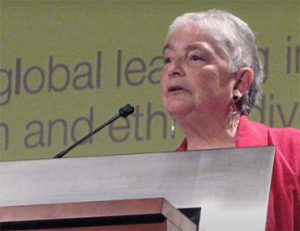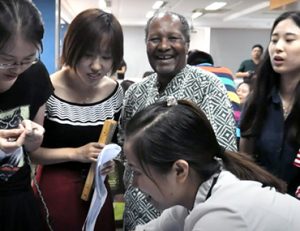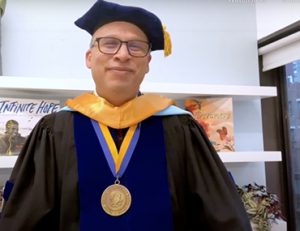On May 6, the Bank Street Graduate School of Education celebrated its annual commencement ceremony, which was hosted via livestream in honor of our graduates from Summer 2019, Fall 2019, Spring 2020, Summer 2020, Fall 2020, and Spring 2021. The ceremony also recognized the degree of Doctor of Humane Letters, Honoris Causa to two recipients: Louise Derman-Sparks, Faculty Emeritus, Pacific Oaks College, and Dr. Hubert Dyasi, Faculty Emeritus of Science Education, City College for their contributions to the field of education.
 Louise Derman-Sparks was recognized for her life’s work as a dedicated educator, an effective community organizer, and a vocal and tireless advocate for equity, justice, and anti-bias education. Now faculty emeritus at Pacific Oaks College, she has worked throughout her career to shine the light on racism, misogyny, homophobia, classism, and ableism in education. As a founding teacher at the Perry Preschool Project in 1960s Michigan, she taught educators and authored many seminal books on anti-bias education, which have become must-have resources for early childhood educators.
Louise Derman-Sparks was recognized for her life’s work as a dedicated educator, an effective community organizer, and a vocal and tireless advocate for equity, justice, and anti-bias education. Now faculty emeritus at Pacific Oaks College, she has worked throughout her career to shine the light on racism, misogyny, homophobia, classism, and ableism in education. As a founding teacher at the Perry Preschool Project in 1960s Michigan, she taught educators and authored many seminal books on anti-bias education, which have become must-have resources for early childhood educators.
“Ms. Sparks understood that educational equity doesn’t just happen—it must become a priority through our focus and our actions,” said Cecelia Traugh, Dean of the Graduate School of Education. “Her groundbreaking work led to teaching educators and, through her writings, to becoming an internationally known expert in anti-bias learning and early childhood education.”
In her own speech, Ms. Sparks said, “If they choose to, early childhood education programs play a vital role in countering the harm of racism and other forms of systemic prejudice on children’s development. Early childhood education practitioners also have a special role in working with others to build a humane, just, and peaceful world where all can thrive. Now you carry on the essential work of early childhood care and education.”
 Hubert Dyasi was recognized for his life’s work as a leading science educator and dedicated human rights advocate who worked around the globe and changed how we as educators think about inquiry-based learning. With the political climate of the 1960s, Dr. Dyasi left South Africa to earn his PhD at the University of Illinois at Champaign-Urbana, but throughout his career, he stayed focused on Black African human rights, returning to join the faculty at the University of Sierra Leone as a specialist in science education. As executive director of the African Primary Science Program, Dr. Dyasi began building a network of science centers in Sierra Leone, Ghana, Kenya, Ethiopia, and more that became internationally renowned and is still thriving today. In support Black human rights movements, Dr. Dyasi then came to City College in New York in 1984 as director of the Workshop Center, a professional development center for teachers, and continued his efforts on behalf of underserved children.
Hubert Dyasi was recognized for his life’s work as a leading science educator and dedicated human rights advocate who worked around the globe and changed how we as educators think about inquiry-based learning. With the political climate of the 1960s, Dr. Dyasi left South Africa to earn his PhD at the University of Illinois at Champaign-Urbana, but throughout his career, he stayed focused on Black African human rights, returning to join the faculty at the University of Sierra Leone as a specialist in science education. As executive director of the African Primary Science Program, Dr. Dyasi began building a network of science centers in Sierra Leone, Ghana, Kenya, Ethiopia, and more that became internationally renowned and is still thriving today. In support Black human rights movements, Dr. Dyasi then came to City College in New York in 1984 as director of the Workshop Center, a professional development center for teachers, and continued his efforts on behalf of underserved children.
Dean Traugh said, “Here at Bank Street, our goals and beliefs are greatly advanced by the human rights work Dr. Dyasi’s life represents.” Additionally, she spoke about the curriculum Dr. Dyasi developed for the African Primary Science Program, which put the natural curiosity of elementary school children front and center, and stating, “Instead of teaching science as a set of isolated facts and knowledge, teachers connect the questions to the real-world phenomena and model the answers for deep learning—an idea that is now at the core of science learning in today’s educational standards.”
Upon receiving his honorary degree, Dr. Dyasi said, “I came to CCNY because I had found out that some leading faculty there and I held closely aligned education ideas, practices, and commitments. Most importantly, just as we did in Africa the ideas and practices were evident not just in statements and publications, but they could also be seen and examined firsthand in concrete learner-centered teacher education programs and learner-friendly learning environments. As it happened, this was true of Bank Street College education programs, as well. Those connections with Bank Street College, as well as the continuing congruence of our education ideas and implementations, make me especially grateful for this award.”
During the commencement ceremony, three Bank Street graduates—Shelby Brody, Luke Muscat, and Su Oh—took the stage to reflect on their experiences and share a few key learnings.
Shelby Brody, a graduate of the Teaching Literacy and Childhood General Education programs, thanked their mentors for how they taught them how to become “That Reading Teacher,” the one who could teach children how to “give themselves over” to books, which, they noted, “was much more like pulling teeth than I ever could have expected.”
Luke Muscat, who earned his MS in Education and Studies in Education in 2020, had to rewrite the speech he had prepared before the pandemic because his “perception of normalcy and life” as an educator had changed to include a reaffirmed reliance on community. He said, “As Bank Street graduates, we have cultivated the tools and affinity for building the powerful relationships to which children thrive, families grow, and communities flourish. Although I cannot speak for other graduates—yet I believe they would agree with me—I am truly ready to take on my future. Ready because I attended a college that understood the power of relationships and modeled to me the very essence of what a progressive educator is.”
Su Oh, a graduate of the Leadership in Museum Education program, acknowledged the last year as “both historic and unprecedented, as we have collectively experienced a global pandemic, a national uprising and demand for racial justice, the end of a presidential tyranny, and the voting in of our first female African American Asian Vice President.” Oh encouraged the graduating class with these words: “Do not shy away from our past but boldly challenge this history…. Take risks, push and challenge yourselves, your colleagues, and our institutions to help us contribute to a better shared society.”
 In his remarks, Bank Street President Shael Polakow-Suransky, GSE ’00, looked back on the challenges of the pandemic for children, urging us to look to next fall as an opportunity to focus not on deficits, but on the new skills and perspectives the children gained and said, “Our task as educators is to create engaging, supportive and creative spaces for learning, repair and resilience…. As you move forward, I hope you will also stay connected with your colleagues and teachers here at Bank Street. We are a support network that will always be here for you as you grow and develop throughout your careers and we want to stay connected.”
In his remarks, Bank Street President Shael Polakow-Suransky, GSE ’00, looked back on the challenges of the pandemic for children, urging us to look to next fall as an opportunity to focus not on deficits, but on the new skills and perspectives the children gained and said, “Our task as educators is to create engaging, supportive and creative spaces for learning, repair and resilience…. As you move forward, I hope you will also stay connected with your colleagues and teachers here at Bank Street. We are a support network that will always be here for you as you grow and develop throughout your careers and we want to stay connected.”
Click here to watch a recording of the ceremony and celebration of the exceptional accomplishments of our graduating classes.